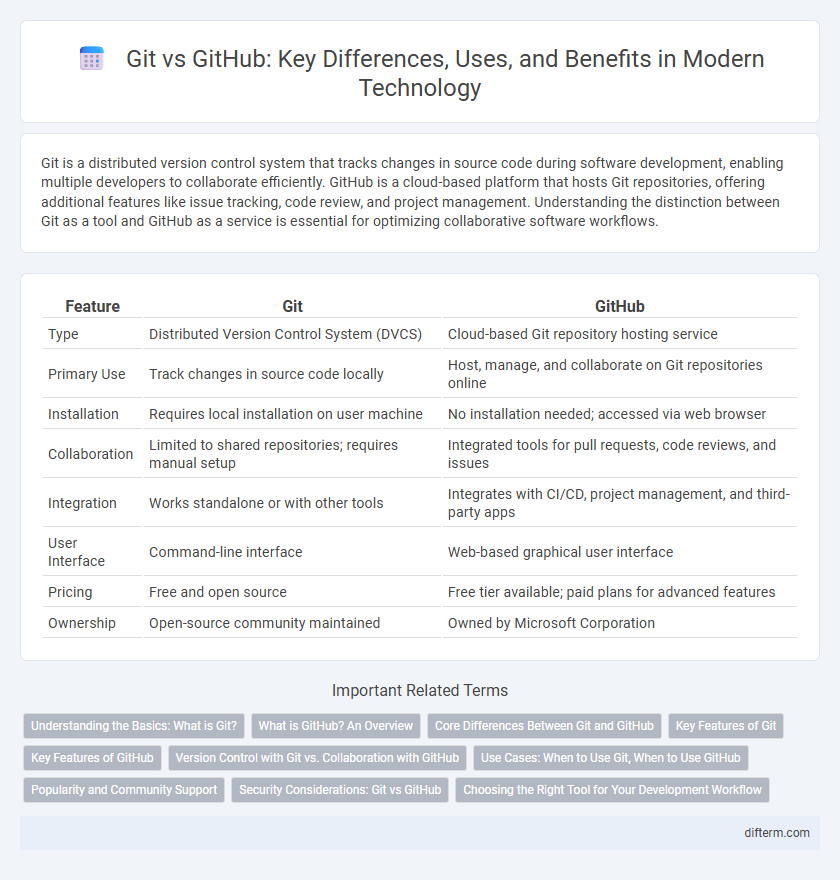Git is a distributed version control system that tracks changes in source code during software development, enabling multiple developers to collaborate efficiently. GitHub is a cloud-based platform that hosts Git repositories, offering additional features like issue tracking, code review, and project management. Understanding the distinction between Git as a tool and GitHub as a service is essential for optimizing collaborative software workflows.
Table of Comparison
| Feature | Git | GitHub |
|---|---|---|
| Type | Distributed Version Control System (DVCS) | Cloud-based Git repository hosting service |
| Primary Use | Track changes in source code locally | Host, manage, and collaborate on Git repositories online |
| Installation | Requires local installation on user machine | No installation needed; accessed via web browser |
| Collaboration | Limited to shared repositories; requires manual setup | Integrated tools for pull requests, code reviews, and issues |
| Integration | Works standalone or with other tools | Integrates with CI/CD, project management, and third-party apps |
| User Interface | Command-line interface | Web-based graphical user interface |
| Pricing | Free and open source | Free tier available; paid plans for advanced features |
| Ownership | Open-source community maintained | Owned by Microsoft Corporation |
Understanding the Basics: What is Git?
Git is a distributed version control system designed to track changes in source code during software development, enabling multiple developers to collaborate efficiently. Unlike centralized systems, Git stores the entire project history on each user's local machine, allowing offline access and fast operations. Core features such as branching, merging, and commit history help manage code versions and streamline the development workflow.
What is GitHub? An Overview
GitHub is a web-based platform that hosts Git repositories, enabling developers to store, manage, and collaborate on code projects in a distributed version control environment. It provides features such as pull requests, issue tracking, and integrated CI/CD workflows, streamlining team collaboration and project management. By combining Git's powerful version control with cloud-based hosting, GitHub facilitates seamless code sharing and community-driven development.
Core Differences Between Git and GitHub
Git is a distributed version control system designed for tracking changes in source code during software development, enabling multiple developers to work on a project simultaneously without overwriting each other's work. GitHub is a cloud-based hosting service for Git repositories that provides collaboration features such as issue tracking, pull requests, and code review, enhancing team workflows and project management. While Git operates locally on a developer's machine, GitHub offers a centralized platform to store Git repositories and facilitates remote access and social coding.
Key Features of Git
Git is a distributed version control system that enables multiple developers to track changes in source code during software development. Its key features include branching and merging, which allow parallel development and easy integration of changes, and a robust commit history that records detailed snapshots of project states. Git's efficiency in handling large projects and offline capabilities ensures seamless collaboration and version tracking across diverse development environments.
Key Features of GitHub
GitHub offers robust version control integration through Git, enabling collaborative code management with features like pull requests, issue tracking, and branch management. Its cloud-based platform supports continuous integration and deployment, facilitating automated workflows and seamless project collaboration. GitHub's powerful code review system and extensive community make it a premier choice for open-source and private repository hosting.
Version Control with Git vs. Collaboration with GitHub
Git provides powerful version control capabilities, enabling developers to track changes, revert to previous code states, and manage branches locally with efficiency and precision. GitHub extends Git's functionality by offering a cloud-based platform that facilitates collaborative workflows through pull requests, code reviews, and seamless integration with CI/CD tools. The synergy between Git's distributed version control and GitHub's social coding features streamlines team development and accelerates project delivery.
Use Cases: When to Use Git, When to Use GitHub
Git is essential for version control in software development, ideal for tracking changes locally within individual projects and enabling branching and merging workflows. GitHub serves as a cloud-based platform for collaborative coding, offering features like pull requests, issue tracking, and continuous integration to streamline team contributions and project management. Use Git for local repositories and offline work, while GitHub excels in hosting remote repositories to foster teamwork and open-source collaboration.
Popularity and Community Support
Git remains the most popular distributed version control system, widely adopted by developers for efficient source code management. GitHub, built on Git, boasts the largest developer community with over 100 million repositories, providing extensive collaboration, issue tracking, and integrated CI/CD tools. The vibrant GitHub ecosystem enhances project visibility and supports a vast network of open-source contributors, making it the preferred platform for developers worldwide.
Security Considerations: Git vs GitHub
Git offers local repository management, which minimizes exposure to external network threats by keeping code changes primarily on a developer's machine, enhancing security through reduced attack surfaces. GitHub introduces access controls, two-factor authentication, and encrypted data transmission to secure collaborative workflows, but it relies on cloud infrastructure, which can be a target for data breaches or unauthorized access. Combining Git's local control with GitHub's cloud security features creates a balanced environment, yet organizations must implement robust policies and regular audits to address potential vulnerabilities in cloud-hosted repositories.
Choosing the Right Tool for Your Development Workflow
Git is a distributed version control system essential for tracking code changes and managing project history, while GitHub provides a cloud-based platform for collaboration, issue tracking, and code hosting. Developers should choose Git when prioritizing offline work and local repository management, whereas GitHub excels in facilitating team collaboration and integrating with CI/CD pipelines. Evaluating your workflow needs, such as solo versus team projects, access to remote repositories, and collaboration features, ensures the optimal selection between Git and GitHub.
Git vs Github Infographic

 difterm.com
difterm.com